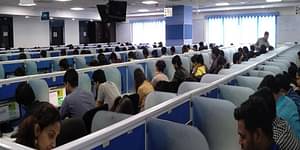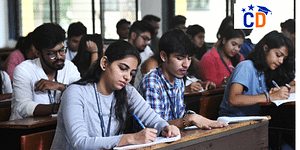BSc Food Technology Syllabus & Subjects 2024
BSc Food Technology Syllabus & Subjects Overview
BSc Food Technology syllabus and subjects emphasise topics associated with Food Science and Human Nutrition. The syllabus is designed in a way that also addresses how these two disciplines are combined. The BSc Food Technology course curriculum imparts knowledge about the production, processing, and preservation of food. Both core and elective subjects are offered in the BSc Food Technology course. Candidates read about food microbiology, food science, physiology in practice, epidemiology, engineering in the food business, etc. in the core areas. They study environmental science as a part of the elective BSc Food Technology subjects.
The food industry is quite profitable in India. Its growing role in the global food industry has given the country a distinct advantage. The food processing business has significantly increased value and fueled expansion in all associated industries in recent years. Aside from that, the BSc Food Technology syllabus explains the scientific methods used to determine the nature of food, nutrition, and food composition. Professionals in this sector will have more opportunities as a result of the constant development. Thus, the course curriculum equips students for careers in allied industries. This page discusses everything related to the BSc Food Technology syllabus and subjects that students should know before enrolling in the course such as semester-wise subjects, reference books, elective and core subjects, course structure, etc.
Table of Contents
- BSc Food Technology Syllabus & Subjects Overview
- BSc Food Technology Year Wise Syllabus (Semester Wise)
- BSc Food Technology Subjects
- BSc Food Technology Common Subjects for All Semester
- BSc Food Technology Optional Subjects
- BSc Food Technology Lab Subjects
- Syllabus for BSc in Food Technology Distance Programs
- BSc Food Technology Entrance Exam Syllabus
- BSc Food Technology Important Books
- BSc Food Technology Course Structure
- FAQs about BSc Food Technology Syllabus
BSc Food Technology Year Wise Syllabus (Semester Wise)
The BSc Food Technology syllabus is segregated into three years and six semesters. Each year has two semesters. The BSc Food Technology Course syllabus is set with certain objectives. The primary objectives of this course’s syllabus are as follows:
· To impart knowledge on different biochemical mechanisms related to food and its properties
· To provide teaching on classification structure
· To explain the importance of Carbohydrates’ function, Biochemistry of Proteins, enzymes, etc.
· To illustrate the implementation of enzymes in the processing of food
· To make the students familiar with the classification and functions of fatty acids
The syllabus and BSc Food Technology course subjects are an important platform to develop practical and problem-solving skills. The in-depth understanding of the BSc Food Technology subjects enables the students to work with accuracy. There are varied dimensions related to Food Technology. With the detailed knowledge incorporated in the BSc Food technology course, students can open up a plethora of job opportunities for themselves.
BSc Food Technology 1st Year Syllabus
The table below lists the BSc Food Technology course subjects for 1st year:
| Semester 1 | Semester 2 |
|---|---|
| Fundamentals of Food Processing | Food Analysis |
| Basics of Food Microbiology | Fermented and Coagulated Milk Products |
| Food Hygiene and Sanitation | Fundamentals of Food Processing |
| Normal and Therapeutic Nutrition | Concentrated and Dehydrated Milk Products |
| Introduction to Food Chemistry | Laws of Food and Quality Assurance |
BSc Food Technology 2nd Year Syllabus
Tabulated below are the BSc Food Technology subjects for 2nd Year:
| Semester 3 | Semester 4 |
|---|---|
| Bakery and Confectionary Products | Processed Food and Vegetable Products |
| Principles of Fruits and Vegetable Technologies | Packaging of Fresh and Processed Foods |
| The Technology of Pulses and Oilseeds | The Technology of Spices and Plantation Products |
| The Technology of Cereals and Millets | Introduction to Finance, Accounts, and Auditing |
| Post-harvest Physiology and Handling of Fruits and Vegetables | Introduction to Business Laws and Ethics |
BSc Food Technology 3rd Year Syllabus
Mentioned below is the semester-wise BSc Food Technology course syllabus for 3rd year:
| Semester 5 | Semester 6 |
|---|---|
| Sugar and Confectionary Technology | Food Dehydration Technology |
| Food Refrigeration and Cold Storage technology | Protein Chemistry and Technology |
| Food Packaging | Emerging Technologies in Food Processing |
| Food Additives | Lab Analysis of Food Lab |
| Food Chemistry | Enzymology Lab |
BSc Food Technology Subjects
Students study varied BSc Food Technology Subjects in the course. As it is previously mentioned both the core and elective BSc Food Technology core subjects are taught through the course curriculum. The subjects of the BSc Food Technology syllabus aim at teaching various domains associated with Food Science and Technology. The entire BSc Food Technology course syllabus allows the students to go through a gradual learning process. At each stage of the course, the students learn something new. The course syllabus and subjects enable the students to develop a strong base on different concepts. Different notions like food composition, nutritional and microbiological aspects, food processing and preservation techniques, the significance of food safety, food packaging, food quality, etc. are illustrated in the syllabus. Apart from that, the course includes food laws and regulations and food engineering as an important part of the study. All the subjects are included to align the broadening areas of Food Technology.
Here goes the list of BSc Food Technology subjects:
| Core Subjects | Elective Subjects |
|---|---|
| Fundamentals of Food Technology | Environmental Science |
| Fundamentals of Food Science | Technical Writing |
| Food Industry Engineering | - |
| Food Microbiology | - |
| Food and Nutrition | - |
BSc Food Technology Common Subjects for All Semester
As discussed, the BSc in Food Technology syllabus is intended to instruct students in the preparation, processing, and preservation of food as well as the different types of machinery utilised in the food sector. The courses aid candidates in comprehending the technical aspects of the food sector and the range of preservation techniques used. Additionally, BSc in Food Technology subjects are broken down into two distinct categories — core and elective. The following are common subjects that are mostly covered by all institutions offering this course. This may, however, vary from one college to another, depending on their curriculum.
- Food and Nutrition
- Food Engineering
- Food Microbiology
- Fundamentals of Food Technology
- Principles of Food Science
BSc Food Technology Optional Subjects
BSc Food Technology optional subjects are an integral part of the course. Both the optional and core subjects together form a strong foundation for the students’ knowledge. These subjects are helpful in many ways. The BSc Food Technology course subjects studied as optional ones give a concrete shape to the overall learning. The knowledge gained through these subjects are supportive of the entire course study.
Students are allowed to choose the optional subjects. Selecting these subjects is critical. To create a positive impact in the future, the optional should be selected based on interest and valid information. These subjects provide expanded job opportunities. Students’ proficiency skills get nurtured through this. Therefore, the students need to check which job scopes can be availed through the optional subjects. Optional subjects broaden the knowledge areas and strengthen the learning acquired through the core BSc Food Technology subjects. Besides, these subjects complement the learning imparted through the BSc Food Technology syllabus.
The list of BSc Food Technology optional subjects is as follows:
· Environmental Science
· Technical Writing
As optional subject, Environmental Science can be a good option for further studies. Again, if a student achieves adequate skill in technical writing, then it could be a great option for taking up technical writing as a career. There is a huge demand for talented professionals in both field
BSc Food Technology Lab Subjects
In some universities/colleges, where BSc Food Technology is offered, some theory-based knowledge is practiced in the lab classes. The topics require the students to obtain practical knowledge on the same. These lab subjects add value to the learning process of the BSc Food technology course syllabus. The lab-based BSc Food Technology subjects are the ones taught through the practical sessions. As lab subjects, they help the students to gain a strong command over the whole learning.
After studying these subjects, they become able to gauge and understand the industry requirements, tools, and technologies used in this field. The subjects aim at developing analytical, critical thinking, and problem-solving skills. The hands-on experiences earned through the lab-based BSc Food Technology course subjects prepare the students as per the industry requirement. And makes the students enable to win-over work challenges irrespective of their complexity. These are some of the positive impacts of lab subjects a student can experience by studying the BSc Food Technology syllabus. The topics covered as the BSc Food Technology lab subjects are as follows:
| Food chemistry and Biochemistry | Food and Human Nutrition |
|---|---|
| Food Production Trend | Food Microbiology |
| Applied statistics | Food Additives |
| Processing and Preservation of Foods | Food Trade and Business Management |
| Food Packaging | Dairy Technology |
| Post-Harvest Technology | Bakery and confectionery Technology |
Syllabus for BSc in Food Technology Distance Programs
Offered by a few universities in India, the distance course objective is to provide the students with the necessary skills and knowledge through a convenient mode of study. By the distance mode of learning, the BSc Food Technology syllabus can be completed through a flexible schedule. The distance learning BSc in Food Technology course is divided into six semesters of six months each. The curriculum aims to instruct candidates in the cultivation, preparation, and maintenance of food. It also discusses the various equipment utilised in the food industry. Students gain an understanding of the technical aspects of the food industry and the many preservation techniques through this coursework. The following is a discussion of the year-wise syllabus for BSc Food Technology distance programs.
First-Year BSc in Food Technology Syllabus for Distance Programs
The following table highlights the first-year semester-wise BSc in Food Technology subjects for distance programs:
| Semester-I | Semester-II |
|---|---|
| Basics of Food Microbiology | Laws of Food and Quality Assurance |
| Food Hygiene and Sanitation | Fermented and Coagulated Milk Products |
| Fundamentals of Food Processing | Fundamentals of Milk Processing |
| Introduction to Food Chemistry | Food Analysis |
| Normal and Therapeutic Nutrition | Concentrated and Dehydrated Milk Products |
Second-Year BSc in Food Technology Syllabus for Distance Programs
The following table highlights the second-year semester-wise BSc in Food Technology subjects for distance programs:
| Semester-III | Semester-IV |
|---|---|
| Bakery and Confectionery Products | The technology of Spices and Plantation Products |
| Post-harvest Physiology and Handling of Fruits and Vegetables | Introduction to Finance, Accounts, and Auditing |
| Principles of Fruits and Vegetables Technology | Introduction to Business Laws and Ethics |
| The technology of Cereals and Millet | Processed Fruits and Vegetable Products |
| The technology of Pulses and Oilseeds | Packaging of Fresh and Processed Fruits |
Third-Year BSc in Food Technology Syllabus for Distance Programs
The following table highlights the third-year semester-wise BSc in Food Technology subjects for distance programs:
| Semester-V | Semester-VI |
|---|---|
| Food Additives | Lab Analysis of Food Lab |
| Food Chemistry | Food Dehydration Technology |
| Food Packaging | Enzymology lab |
| Food Refrigeration and Cold Storage Technology | Protein Chemistry and Technology |
| Sugar and Confectionery Technology | Emerging Technologies in Food Processing |
BSc Food Technology Entrance Exam Syllabus
The BSc Food Technology course syllabus for the entrance exam is important for any aspirants who want to pursue the course. One of the major entrance exams for BSc Food Technology is CUET. For the Hons. course of BSc Food Technology, students require to appear in the CUET examination to get admission to colleges under DU (Delhi University). Aspirants of this course need to appear in the CUET exam in any of the following subject combinations:
Combination I: Physics + Chemistry + Biology/Biological Studies/ Biotechnology/ Biochemistry OR Combination II: Physics + Chemistry + Mathematics
Listed below are the syllabus topics of individual subjects aspirants of BSc Food Technology should be prepared for CUET exam:
| Physics | Communication Systems, Electronic Devices, Optics Electrostatics, Current Electricity, Magnetic Effects of Current and Magnetism, Electromagnetic Induction and Alternating Currents, Electromagnetic Waves, Dual Nature of Matter and Radiation |
|---|---|
| Chemistry | Solid State, Solutions, Electrochemistry, Chemical Kinetics, Surface Chemistry, General Principles and Processes of Isolation of Element, p-Block Elements, d and f Block Elements, Coordination Compounds, Haloalkanes and Haloarenes, Alcohols, Phenols, and Ethers, Aldehydes, Ketones, and Carboxylic Acids, Organic Compounds Containing Nitrogen, Biomolecules, Polymers, Chemistry in Everyday Life |
| Biology | Reproduction, Genetics and Evolution, Biology and Human Welfare, Biotechnology and Its Applications, Ecology and environment |
| Mathematics | Section A: Algebra, Calculus, Integration and Its Application, Differential Equations, Probability Distributions, Linear Programming Section B1: Relations and Functions, Algebra, Calculus, Vectors and Three-dimensional Geometry, Linear Programming, Probability Section B2: Numbers, Quantification and Numerical Applications, Algebra, Calculus, Probability Distributions, index Numbers and Time-Based Data, Financial Mathematics, Linear Programming |
BSc Food Technology Important Books
The reference books used for the BSc Food Technology contain subject-oriented useful information. In these books, the resources are usually presented in an organized manner. These books aim at giving complete information on a certain topic. Students get a direction for their knowledge. They refer to these books whenever they get stuck in the middle of their understanding. In the books, the students get every concept in an elaborated form. They deeper the understanding and enrich the learning. As the topics are vividly presented in every Food Technology related book, students can get easily immersed in the topics. The useful information shared in such books helps them to take their learning to an advanced level.
The lists here show the names and authors of the books:
| Books | Authors |
|---|---|
| Food Science | B.Srilakshmi |
| The Food Chemistry Laboratory | Connie M. Weaver and James R Daniel |
| Basics Food Preparation: A Complete Manual | Seth V, Singh K |
| Food Chemistry | Meyer |
| Biochemical Methods | Sadasivam and Manickyam |
| Introduction to the Bio-Chemistry of Foods | Braverman |
Practical Physiological Chemistry | Hawk PB, Oser BL and Summerson |
| Qualitative Tests and Quantitative Procedures in Biochemistry | Sundararaj P and Siddhu A |
| Food product Development | Graf and Saguy |
| Agricultural Administration in India | K. Vijaya Raghavan |
| Food and Nutrition | M. Swaminathan |
| Text Book of Human Nutrition | Mahatas, S.Banji, N. Prashad Rao and Vinodini Reddy |
| Principles of Biochemistry | Lehninger A L, Nelson D L and Cox M M |
| Fruits and Vegetables preservation, principles and practices | R.P.Srivastava and Sanjeev Kumar |
| Principles of Food Chemistry | John M.Deman |
| Food Microbiology | Frazier William C and Westhoff, Dennis C |
| Food Microbiology | Banwartt |
| Modern Food Microbiology | Jay, James M |
BSc Food Technology Course Structure
BSc Food Technology course structure is prepared to provide a systematic education to the students. The course goes through different stages. Initially, the core subjects explain the fundamentals of Food Technology, and then it goes deeper into the concept. To support the learning there are several lab sessions in which the students are taught about using tools and techniques. It details how large-scale plants and machines are operated in the industry. Hands-on learning is provided through the lab sessions. Different creative methods are also implemented to present the BSc Food Technology syllabus in an engaging manner.
Group discussions, animations of blending machines etc. are part of it. Students of Food Technology need to work on different projects. These projects are a way to assess the student’s understanding of different concepts. Students get a clear picture of what and how much they have understood a certain topic. Design and development of equipment used for cleaning, and the making of tomato-based drinks are some of the projects students work on. In all the universities and colleges that offer BSc Food Technology, an age-appropriate teaching pedagogy is used to support the course structure.
Listed below is the course structure followed in most institutes to teach BSc Food Technology course:
· Six semesters
· Core subjects
· Optional Subjects
· Lab sessions
· Demonstrations
· Projects
· Industry Visit
FAQs about BSc Food Technology Syllabus
What are the best colleges for BSc Food Technology?
Which government colleges offer the best BSc in Food Technology course curriculum?
The list of government colleges that offer the best BSc in Food Technology course curriculum includes Tezpur University, Panjab University, NIFTEM Sonepat, National Institute of Technology Rourkela, Jadavpur University, Institute of Chemical Technology, Indian Institute of Technology Kharagpur, Indian Institute of Food Processing Technology Thanjavur, Guru Nanak Dev University, Annamalai University, and more.
Which private colleges offer the best BSc in Food Technology course curriculum?
The list of private colleges that offer the best BSc in Food Technology course curriculum includes Vignan's Foundation for Science, Technology and Research, UPES Dehradun, Shoolini University, Sharda University, Lovely Professional University, KEC Engineering College, Karunya Institute of Technology and Science, Kalasalingam Academy of Research and Education, Chandigarh University, Amity University Noida, and more.
What are the popular BSc in Food Technology project topics?
Candidates studying food technology have a variety of project options to choose from, including filtration, food extraction, and food prototypes. These projects assist them in gauging their level of mastery of a specific theory or subject covered in the class. Listed below are some popular BSc in Food Technology project topics:
- Non-destructive determination of sweetness of melons
- Development of Tomato-based drink
- Design and development of cleaning equipment for milled millet
What methodologies and techniques are used for teaching BSc in Food Technology subjects?
The methodologies and techniques that are used for teaching BSc in Food Technology subjects include both classroom lectures and live demonstrations. The following are some strategies utilised:
- Factory Visit
- Food Science Laboratory
- Food Technology Laboratory
- Group Discussions
- Practical Sessions
What is the BSc in Food Technology course structure?
The BSc in Food Technology course structure is divided into six semesters for three years. To further illustrate how massive plants and machinery operate in the business, numerous lab sessions and simulations are presented to students. The programme structure typically includes the following:
- Core and elective subjects
- Lab sessions
- Live demonstrations
- Simulations
- VI semesters
What are the elective BSc in Food Technology subjects?
The list of elective BSc in Food Technology subjects includes Technical Writing and Environmental Science. These subjects may vary from one university to another which students can choose based on their academic interests or career aspirations.
What are the core BSc in Food Technology subjects?
The list of core BSc in Food Technology subjects includes Food and Nutrition, Food Engineering, Food Microbiology, Fundamentals of Food Technology, Principles of Food Science, and more. These subjects are commonly incorporated into the course curriculum of all universities offering this course.
What are the BSc in Food Technology subjects for the third year?
The list of BSc in Food Technology subjects for the third year includes Food Chemistry-I, Food Chemistry-II, Food Engineering, Food Quality and Sensory Evaluation, Introduction to Food Safety, Introduction to Quality Attributes, Natural Food Pigments, and Trends in Food Microbiology.
What are the BSc in Food Technology subjects for the second year?
The list of BSc in Food Technology subjects for the second year includes Biomolecules, Food and Nutrition, Food Microbiology, Packaging of Food, Technology of Cereals, Pulses, and Oilseeds, Technology of Dairy and Seafood, Technology of Fruits, Vegetables and Plantation Crops, and Technology of Meat, Poultry, and Eggs.
What are the BSc in Food Technology subjects for the first year?
The list of BSc in Food Technology subjects for the first year includes Environmental Science, Food Processing Technology, Food Processing Technology Practical, Fundamentals of Food Technology, Fundamentals of Food Technology Practical, Principles of Food Science, Principles of Food Science Practical, Technical Writing, Technology of Food Preservation, and Technology of Food Preservation Practical.
Popular Courses
- Courses
- BSc Food Technology
- Syllabus


















